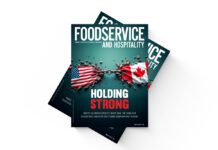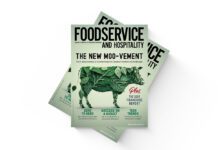By Nicole Di Tomasso
At Maple Leaf Foods, sustainability is more than just a buzzword — it’s a guiding principle. By setting audacious goals and taking concrete actions to reduce its environmental impact, prioritize food safety, improve animal welfare and engage with communities, Maple Leaf Foods is setting a higher standard for the entire food industry.
Headquartered in Mississauga, Ont., Maple Leaf Foods, Foodservice and Hospitality’s Pinnacle Award winner for Supplier of the Year, is a leading protein company that employs approximately 14,000 people and produces high quality, innovative products under the following brands: Maple Leaf, Maple Leaf Prime, Maple Leaf Natural Selections, Schneiders, Mina, Greenfield Natural Meat Co., Lightlife, Field Roast, Fantino and Mondello, Lunch Mate, Grab’N Snack and more. The company’s portfolio includes prepared meats, ready-to-cook and ready-to-serve meals, snack kits, value-added fresh pork and poultry and plant-protein products. As of 2022, the company reported $4.7 billion in sales.
“We supply branded and private-label products to foodservice customers from coast to coast, and in 2021, we became the largest branded manufacturer in packaged meats within the Canadian foodservice industry,” says Josh Kuehnbaum, senior VP Foodservice Sales & Marketing – North America, Maple Leaf Foods.
Since early 2022, the commercial production of bacon has continued to ramp up at the company’s new $182 million, 73,000 sq. ft. Bacon Centre of Excellence in Winnipeg to meet growing customer and consumer demand. A key foodservice partner benefitting from this new facility is A&W Canada, according to a company release.
That same year, Greenleaf Foods, SPC, teamed up with Booster Juice to bring plant-based protein to its permanent menu at locations across Canada for the first time. The chain now offers two new sandwiches, the Italian Crumble Plant-Nini and Italian Crumble Plant Wrap, featuring Field Roast Italian Garlic & Fennel Plant-Based Sausage, which is crafted with eggplant, onions, sweet peppers and seasoned with sea salt, fennel seed and garlic.
The foodservice ideation process originates from The Maple Leaf ThinkFOOD! Centre where partners, product developers and chefs can innovate and collaborate on food concepts and menu ideas, according its website. The 25,000-sq.-ft. facility features a development kitchen, pilot plant for small-batch development, presentation kitchen, back-of-house testing kitchen, sensory testing area, presentation forum and a culinary library.
Beyond its product development, one of the most remarkable achievements in Maple Leaf Foods’ sustainability journey is becoming the first carbon-neutral food company in the world in 2019, and the first food company in Canada to set science-based targets to reduce its greenhouse-gas emissions, approved by the Science-Based Targets initiative.
“Maple Leaf Foods set an ambitious science-based target to reduce our carbon emissions by 30 per cent by 2030. Our goal is to reduce our environmental footprint as an organization, [with a focus] on electricity, natural gas, water, solid waste and food waste,” says Kuehnbaum. “Currently, we have a wide range of initiatives in flight across our network as we work toward this goal.”
In fact, the company’s Heritage facility in Hamilton, Ont., which spans approximately 500,000 sq. ft. of floor space and employs more than 900 team members, was recently awarded the Leadership in Energy and Environmental Design (LEED) Silver certification by the Canada Green Building Council.
The facility has implemented several initiatives that have led to gradual reductions in the company’s environmental impact, including a national LED lighting retrofit program, equipment efficiency and optimization upgrades, ammonia heat recovery and wasted-heat recovery systems, composting and recycling programs, control measures and closed-loop systems for water use and improvements to storage, handling and employee training to reduce food waste.
As a result, the facility reduced its electricity intensity by 72.9 per cent, natural gas intensity by 47.2 per cent, water intensity by 54.8 per cent (all from a 2014 baseline), solid-waste intensity by 51 per cent (from a 2015 baseline) and food-waste intensity by 45.4 per cent (from a 2016 baseline).
Additional company-wide achievements include a 99.1-per-cent reduction in antibiotic use in the company’s hog-production operations since 2014; 17.1-per-cent reduction in solid waste intensity since 2015; and the completed conversion of all Maple Leaf sow barns to its Advanced Open Sow Housing System by the end of 2021.
Sustainability can also extend beyond environmental concerns. Through community-impact programs, Maple Leaf Foods supports initiatives that address food insecurity. Today, 18.4 per cent of Canadians are experiencing food insecurity and one in four children are living in a food-insecure household. In response to this crisis, the company launched its Maple Leaf Centre for Food Insecurity (the Centre) in 2016.
“The Centre [is] an organization that collaborates with non-profit and charitable organizations, the private sector and governments with the goal of reducing food insecurity by 50 per cent by 2030,” says Kuehnbaum. “The Centre works to raise awareness of this pressing social issue, advocate for critical policy changes and invest in scalable programs that seek to directly support people and households facing food insecurity.”
In addition to the Centre, Maple Leaf Foods also partners with food banks across Canada and recently launched a new employee-based program called ‘Raise the Good in the Neighbourhood,’ where salaried employees have two free volunteer days with a cause of their choice. Last year, volunteers logged more than 1,800 hours.
Maple Leaf Foods has made great strides to recognize the role of diversity, equity and inclusion (DE&I) within its organizational culture in the pursuit of a sustainable and responsible future. The company’s Diversity and Inclusion Blueprint focuses on four key pillars, including driving accountability to represent the communities it serves; aligning its people practices to its values; facilitating deep listening and nurturing curiosity; and fostering cultural change that creates broad engagement. This year, Maple Leaf Foods was recognized with the inaugural Diversity, Equity and Inclusion Award from North America Meat Institute for demonstrating the strongest DE&I vision and strategic roadmap. It was also named to the Forbes list of Canada’s Best Employers 2023.
Highlights from the company’s DE&I initiatives include expanding gender-inclusive benefits to support 2SLGBTQ+ team members and their loved ones, such as gender-affirmation procedures and treatments and drug coverage for hormone therapy, and increasing investments in mental-health paramedical coverage. Maple Leaf Foods also partners with the Centre for Addiction and Mental Health (CAMH) for its You Are Not Alone! initiative to stop the stigma, offer accommodation, provide access to support and facilitate education.
“We know we’re so much stronger when people know they are accepted and valued for who they are and what they bring to the workplace,” says Kuehnbaum. “Building diverse and inclusive teams is a core pillar within our Leadership Values and we’re building, investing in, recognizing and rewarding remarkable people who value an inclusive workplace, embrace all forms of diversity and commit to include every voice in a highly collaborative environment.”
While Maple Leaf Foods has made remarkable advances in sustainability, Kuehnbaum says the company acknowledges that there are still challenges ahead, such as climate change, global supply-chain issues, labour shortages and food inflation. However, this awareness is driving the company to push the boundaries of innovation and sustainability further.
“Specific to the global supply-chain challenges, everything from packaging to ingredients and raw materials were in short supply with incredibly long lead times, and in keeping with most sectors, labour shortages further augmented the issue,” says Kuehnbaum. “Through large, dedicated and highly concerted efforts [internally] and [externally with our partners], we’re proud of how we navigated the global-supply challenges. That said, we’re always looking for ways to do and be better. To that end, we’ve invested in significant amounts of new equipment and production capabilities to help ensure we continue to delight our customers on a daily basis now and well into the future.”
Kuehnbaum continues, “While we have made great strides on our journey, we recognize there’s still more work to be done. Our Sustainability Execution Task Force is focused on near-term reduction and optimization opportunities to reduce our environmental footprint, and we’re exploring longer-term, high-impact greenhouse-gas-reduction technologies to help us on our path to meet our emission-reduction targets, including work in anaerobic digestion and our investments in re-generative agriculture within our feed grain supply chain.”
By weaving sustainability into every facet of its operation, Maple Leaf Foods serves as an inspiring example for other food companies to follow. Its commitment to sustainability is a testament to the belief that excellence in food production can co-exist with a responsible approach to the environment and society.
“We’re proud of our vision to be the most sustainable protein company on earth, but the work is just beginning and, as with anything, we’re all better together,” says Kuehnbaum. “I’m encouraged by the conversations we’ve been having within the industry [and] identifying ways we can collaborate to fight climate change and help protect and preserve our planet for future generations.”


















